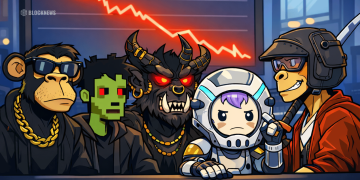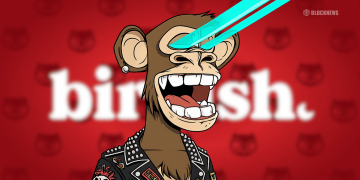Multinational automobile company Ford has recently made headlines by filing 19 trademark applications to enter the metaverse and NFT industries. These applications would give Ford a unique edge for its plans, including—but not limited to—online marketplaces, virtual reality automobiles, and downloadable virtual goods.
Ford Enters the Metaverse
Ford, the largest U.S.-based automaker by sales, is prepared to enter the metaverse. It has long demonstrated its interest and intent to enter the crypto, NFT, and metaverse sectors. Now, the automaker joins numerous other companies in the auto industry.
Ford recently filed 19 trademark applications to cover a breadth of plans—demonstrating “a comprehensive uptick” in this area.
On September 2, Ford filed documents in the United States Patent and Trademark Office (“USPTO”) documents for trademarks regarding “downloadable artwork, text, audio and video featuring its cars, SUVs, trucks, and vans”—all of which are to be authenticated by NFTs. There are even going to be virtual cars and trucks and clothing for Ford, as well as an online marketplace for NFTs.
Ford is looking to roll out a plan for digital goods and entertainment services for the public. The downloadable virtual goods will be used mainly in the virtual world and will entail cars, vans, trucks, clothing, vehicle accessories, and parts. In addition, Ford has big plans to “host virtual car online exhibitions via Augment Reality (AR) and Virtual Reality (VR).”
This news came a little after Ford Executive Chairman Bill Ford and CEO Jim Farley announced that Ford was cutting 3,000 jobs to lower costs.
Ford’s Trademark Applications
Trademark attorney Michael Kondoudis shared via Twitter that the company plans to offer “Virtual automobiles, SUVs, trucks and vans, land vehicle parts and accessories, and clothing;” and “Online retail store services featuring NFTs and digital collectibles.”
The trademarks filed with the USPTO are separated into four categories:
International Class 009: This Class entails downloadable multimedia files, including artwork and video—including automobiles, SUVs, trucks, and vans authenticated by NFTs. Also included in this category are downloadable virtual goods and clothing for use in online virtual worlds.
International Class 035: This Class aims to promote the digital artwork of others by using a website and providing online retail store services for NFTs and digital collectibles.
International Class 041: This Class sought to offer entertainment services such as online non-downloadable virtual automobiles, SUVs, trucks, etc., clothing for virtual environments, and online exhibitions for virtual reality and augmented reality plans.
International Class 042: This Class provides other online non-downloadable digital content and involves designing and developing software for digital artwork.
Other Automakers and the Metaverse
Ford is not the only automaker making waves within the metaverse and with NFTs. It follows a long line of companies in the automotive industry already experimenting and dabbling in crypto, NFTs, and the metaverse.
Porsche recently celebrated its 70th anniversary in Australia, and, to commemorate this occasion, it released three NFT digital art pieces which featured the Taycan Turbo.
Lamborghini is another prime example. Lamborghini announced three NFT projects. The first involved the auction of an “Aventador Ultimae” with a linked NFT. The second was unveiling its “Space-Time Memory” NFT Project—its first NFT project. The last project was announcing its NFT space in collaboration with NFT PRO and INVNT.ATOM.
Hyundai also launched an NFT project, which offered an NFT membership club that entailed memorable experiences and utilities to IONIQ 6 NFT owners. In addition, Kia released an advertisement for an all-new 2023 Soul, including a QR code that viewers can scan and earn NFTs.
There is something special about NFT cars and virtual cars. To illustrate, a recent research article by Vanarama revealed that some NFT fans are willing to pay more for virtual cars than actual cars. For example, an image of the Nissan GT-R car was sold for an impressive $2.3 million, far exceeding the price of a real car.
Although Ford’s long-term goals may be unknown, its trademark applications demonstrate its commitment and represent “a solid sign of the company’s future approach.”
Conclusion
Ford follows multiple other automakers that are slowly but surely entering the metaverse. Whether the plans entail Web3, NFTs, cryptos, and so on, companies such as Ford are not wasting any time filing for trademark applications and getting started.












